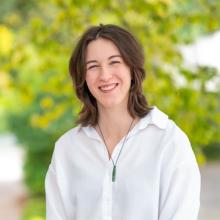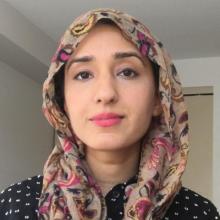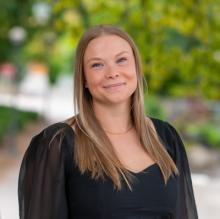Sweeney Magee, Molly
The evidence is clear that many colorectal cancer (CRC) survivors fail to maintain a healthy weight, engage in regular exercise, or have a healthy diet. Effective interventions are needed to assist CRC survivors to behave in ways that will improve their health and quality of life. My PhD thesis aims to consolidate the available evidence on the most effective and acceptable behavioural interventions to improve adherence to key health behaviours in CRC survivors.
Research Description
Adhering to health behaviour guidelines has been shown to be effective in reducing cancer recurrence, mortality, and co-morbidities in colorectal cancer (CRC) survivors. However, the evidence is clear that many CRC survivors fail to maintain a healthy weight, engage in regular exercise, or have a healthy diet. Effective interventions are needed to assist CRC survivors to behave in ways that will improve their health and quality of life. There is a growing evidence base for various interventions in this group, but a lack of consensus on the most effective intervention strategies. My PhD thesis aims to consolidate the available evidence on the most effective and acceptable behavioural interventions to improve adherence to key health behaviours in CRC survivors. I will combine this information with an analysis of change in health behaviours (or lack thereof) in CRC survivors in the BC Generations Project (BC’s largest ever health study) to inform the design of a brief behaviour change intervention in CRC survivors. I will work with the BC Cancer Agency and CRC survivors to maximize the patient acceptability and feasibility of this intervention.
What does being a Public Scholar mean to you?
To me, being a Public Scholar is an important step towards connecting my research with the real world. There is often a detachment between research in the field of population and public health and the application of this work in settings where it can be most useful. Through the Public Scholars program, I hope I can bridge this gap by engaging both with those who can implement my research, and patients who can directly benefit from my work. To have the benefit of these connections at the outset of my research will be invaluable in shaping it from the ground up.
In what ways do you think the PhD experience can be re-imagined with the Public Scholars Initiative?
The emphasis on public engagement within the Public Scholars Initiative is an exciting change to the traditional perspective on the PhD experience. Knowledge translation is often only tacked on to the end of PhD theses and is generally a unilateral process – the PhD student shares what they have learned with the community they have been studying. In my view, the innovation of the Public Scholars program is in encouraging students to learn from the communities they are studying, and incorporate these perspectives into the design of their research. The Initiative also supports students to be more thoughtful and creative in how they share their findings with both the communities they have worked with, and the broader public. This re-imagining of the PhD experience is beneficial in broadening the learning of us as students, as well as promoting a more modern image of advanced graduate learning to those outside of academia.
How do you envision connecting your PhD work with broader career possibilities?
The training I received as part of my PhD to date and during my previous degrees has prepared me for the practicalities of designing and conducting research studies. However, the Public Scholars Initiative is a welcome opportunity to connect with the type of service providers who can translate my research findings into public health programs. This experience will be invaluable to me in contributing to my post-PhD career goals of working in the design and implementation of health-related behavioural interventions.
How does your research engage with the larger community and social partners?
My research aims to prioritize patient acceptability in the design of health behaviour interventions. Firstly, I am conducting an integrative review to consolidate the evidence on the most effective and acceptable behavioural interventions to improve health behaviours in colorectal cancer survivors. I have opted for an integrative review to ensure patient opinions will be incorporated into my conclusions via the inclusion of qualitative research this review approach allows. The next stage of my research will engage both colorectal cancer survivors and local health care decision makers to design and test the feasibility of an intervention to improve adherence to key health behaviours in colorectal cancer survivors. Members of the colorectal cancer survivor community will be involved in shaping all stages of my research, from initial design to dissemination.
Why did you decide to pursue a graduate degree?
Prior to starting my PhD I worked on a large research study in University College London. This made me realize that completing a PhD was the best way to ensure I had the necessary training to design and implement my own research studies. I was also keen to challenge myself, and continue learning.
Why did you choose to come to British Columbia and study at UBC?
My primary reason for deciding to study at UBC was two-fold. Firstly, I wanted to work within the Centre of Excellence in Cancer Prevention with my supervisors who are leaders in the field of cancer prevention. Secondly, Vancouver struck me as a beautiful city in which to live and embrace a healthier lifestyle. I have not been disappointed in either regard since moving here.
Being a Public Scholar is an important step towards connecting my research with the real world.



